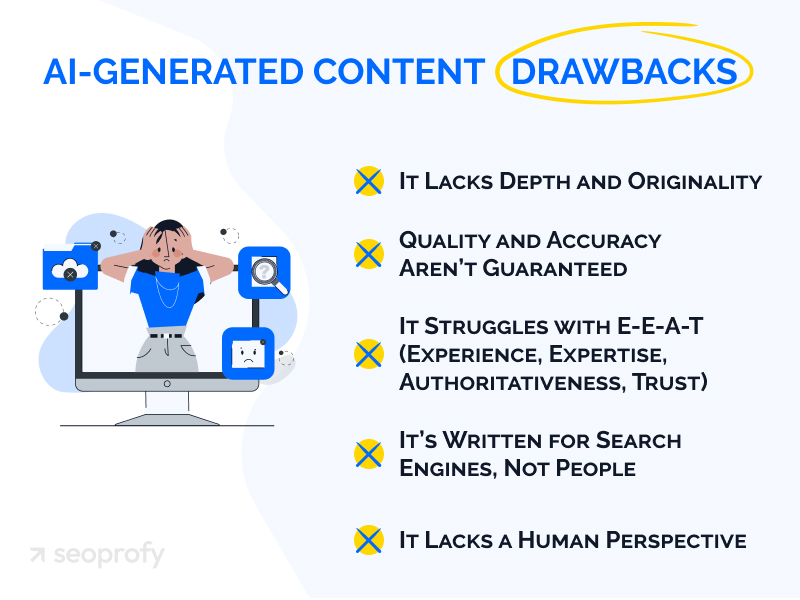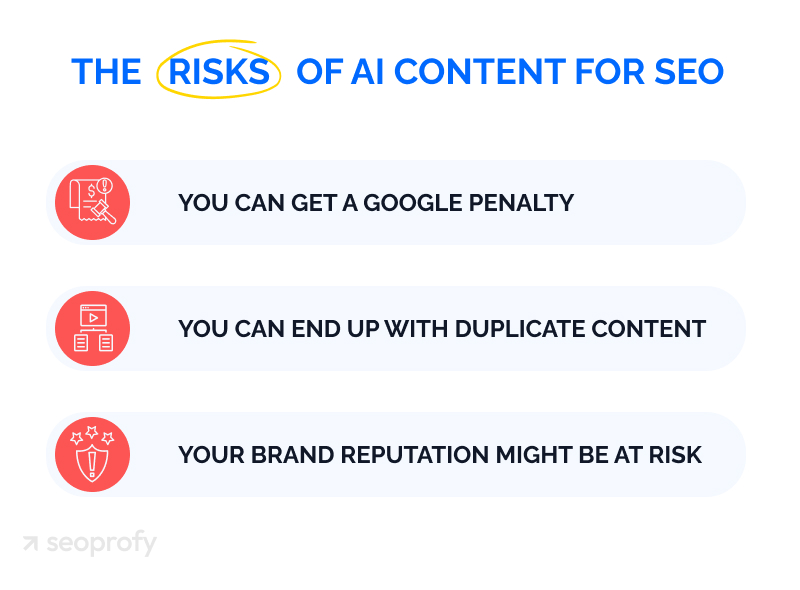The Impact of AI-Generated Content on Traditional SEO Practices
The rise of AI-generated content is fundamentally altering the landscape of search engine optimization (SEO), challenging long-standing practices and prompting a reevaluation of what drives search visibility and user engagement.
Key Changes to Traditional SEO
- Shift from Keyword-First to Intent-First: Traditional SEO relied heavily on keyword targeting and backlink acquisition. AI, especially in search engines like Google, now prioritizes understanding user intent and context over exact keyword matches. Content that directly answers user questions and provides comprehensive, trustworthy information is more likely to be surfaced—whether in traditional rankings or AI-generated summaries.
- Decline in Click-Through Rates: With AI Overviews and similar features, many users find answers directly on the search results page, reducing the need to visit individual websites. Over half of Google searches in the U.S. now end without a click, making traditional traffic metrics less reliable indicators of SEO success.
- Content Volume vs. Quality: The ability to generate content at scale with AI has flooded the web, but without genuine insight, human touch, or user experience (UX) value, much of this content goes unnoticed. Quality, authority, and accuracy are now more critical than ever for visibility.
- Technical SEO as Table Stakes: While technical optimization (speed, mobile-friendliness, structured data) remains important, it is no longer a differentiator. The focus has shifted to overall content quality and user experience.
The Role of AI-Generated Content in SEO
- Acceptance by Search Engines: Major search engines like Google do not penalize AI-generated content simply for being AI-generated. The critical factor is whether the content is useful, helpful, original, and aligns with E-E-A-T (Experience, Expertise, Authoritativeness, Trustworthiness) guidelines.
- Potential Pitfalls: AI-generated content can sometimes be inaccurate or lack depth, which can harm a site’s credibility and rankings if not carefully reviewed and edited. There is also a risk of producing generic or thin content that fails to stand out in an increasingly crowded digital space.
- Successful Use Cases: When AI is used responsibly—combined with human oversight, thorough editing, keyword research, and optimization—it can scale content production while maintaining or even improving quality and performance. Some experiments have shown significant increases in clicks and impressions when AI-generated content is properly optimized and enhanced by human expertise.
- Emerging KPIs: As AI reshapes how content is discovered and consumed, new key performance indicators are emerging, such as brand mentions in AI overviews and voice search results, alongside traditional metrics like organic traffic and rankings.
What Hasn’t Changed
- Quality Content Remains King: Regardless of how content is created, search engines and AI tools prioritize original, authoritative, accurate, and helpful content that solves real user problems. Content that demonstrates expertise and provides genuine value continues to outperform generic or low-quality alternatives.
- User-Centric Focus: The emphasis is increasingly on creating content that aligns with user intent, offers depth and clarity, and delivers a positive user experience—whether the audience is human or an AI summarizer.
Actionable Recommendations for SEO Practitioners
- Audit Content for AI Readiness: Ensure your top pages contain clear, structured information that AI can easily extract and cite.
- Optimize for Featured Snippets and Structured Data: Create content that answers specific questions concisely and is well-organized for both humans and machines.
- Combine AI Efficiency with Human Expertise: Use AI to scale content production and optimization, but always review, fact-check, and enhance outputs with human insight.
- Track New Metrics: Monitor brand visibility in AI overviews, voice search, and other emerging channels, in addition to traditional SEO KPIs.
- Focus on Authority and Trust: Build comprehensive resource pages and demonstrate topical expertise to increase the likelihood of being cited by both search engines and AI tools.
Conclusion
AI-generated content is not inherently good or bad for SEO—its impact depends on how it is used. While AI is disrupting traditional SEO practices by shifting the focus from keywords and backlinks to intent, quality, and user experience, the core principles of creating valuable, trustworthy content remain unchanged. The most successful SEO strategies will leverage AI’s efficiency while maintaining a strong emphasis on quality, accuracy, and user-centricity.





